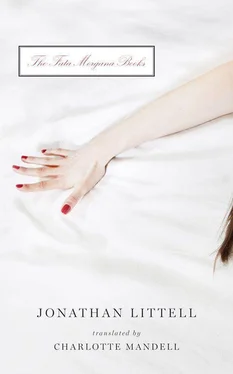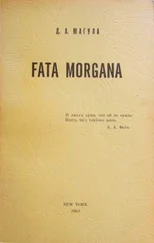* * *
Outside, at the street corner, I glimpsed a shadow behind one of the plane trees. I leaped over and seized it by the wrist: “What do you want? What are you doing here? Are you spying on me?” She glared rebelliously at me and tried to free her arm, but I held it firmly. “Come with me.” Without letting her go, I brought her back to the apartment; she followed me unprotesting to the sky-blue door, which stood out from afar in the midst of the building’s wide, dirty brick façade. Opening it, I noticed that the paint was peeling: It needs repainting, I said to myself as I pushed in the door, perhaps in a color that matches the stairway better. I pulled the girl, who was still not protesting, up the steps to the narrow landing, where once again I hesitated in front of the two doors. Finally I chose the one on the left, the black one. The room was dark until I turned on the light: everything, the furniture, the floor, the loft where the bed was, was covered in large plastic sheets, dirty but transparent. One of the sheets, draped over a stool, formed a bulge on which a set of building blocks was placed, an assemblage of red, yellow, blue, black, and white pieces, the only touch of color in this grey, abandoned room, a room that looked as if it were waiting for repairs forever delayed. I contemplated the window with dismay; behind it the white wall of the air shaft gleamed weakly. “So, the other room, then,” I finally conceded with regret, without looking at the girl who remained silent. This room was more open, I could see right away; the window, here, looked out on a brick wall, so close you could almost touch it, but the long narrow room didn’t look dark, and it suited me. The walls were pale, they must once have been white, but time had stained and dirtied them, you could even see indistinct traces of color, and they were covered in pictures, photographs, newspaper clippings, old sepia prints, pages torn from books, tacked on or stuck there with yellowed Scotch tape. I had no idea who could have assembled this clutter of images, perhaps another tenant, perhaps me, at another time, hard to say. Near the door stood a blondwood board resting on metal trestles, on which lay scattered a few books, most of them with their covers torn off, and some piles of papers; on the other side, a low, round table with a chair occupied the space in front of the bed, so wide that it left only a narrow passageway to reach the bathroom door, painted the same red as the entry door. I motioned the girl to the bed: “Go on, lie down there.” She skirted round me with a childlike laugh and crossed the mahogany-colored floor as if she had no feet; in front of the bed, she spun round in a fluid motion and let herself fall back, her arms outstretched, scattering her Venetian blonde hair on the lilac expanse of the sheets, without taking off her apple-green raincoat, which revealed smooth, slim legs. I sat down at the round table, poured myself a drink from a bottle there, and lit a cigarette.The girl laughed in crystal-clear tones and leapt up. “You’re funny!” she laughed. She let her raincoat slip to the bed; underneath, she wore a short, eggplant-colored summer dress, chiffon possibly, which barely reached below her upper thighs. She ran her fingers through her thick shoulder-length hair and walked lightly forward. I stretched out my hand to caress her thigh in passing, but she smoothly dodged it, and my fingers just grazed the thin, rustling cloth of her dress as she slipped behind the desk and began playing with the papers, leafing carelessly through the piles. “Don’t touch,” I scolded, amused. — “Why don’t you offer me a drink?” she asked, smiling, still looking at the papers. I poured her a glass and brought it to her; she drank a mouthful and suddenly raised her large, dark eyes to me, deep and laughing. “Will you run me a bath?”—“Run it yourself,” I retorted rudely, sitting back down at the round table. She burst out laughing, straightened up and crossed the room, undoing the hooks on the back of her dress, which she slipped smoothly over her head and threw onto the sheets to join the green raincoat. Aside from the dress, she wore nothing but a pair of tiny, salmon-colored panties made of an almost transparent tulle; I admired the long curve of her back, the radiance of her golden skin, the slender nape of neck under her short hair. “You are a boor!” she called out to me before turning round, hands on her hips. “Do you think I’m beautiful?” she went on, her laughter intensifying. Her brown nipples stood out on small breasts, I could make out her thick pubic hair under the thin cloth of the panties; she fluffed out her hair with her hands and smiled wide, young, splendid, and proud. I didn’t say anything, happy simply to look at her. “Boor!” she repeated, still laughing. She opened the bathroom door and busied herself near the enamel bathtub; water gushed out from the big white faucets. I watched her through the half-open door: she straightened up, took off her panties, lifting first one foot, then the other; then she disappeared from my sight and I heard a liquid tinkling, softer and shriller than the jet gushing out of the faucets. As the sound continued I let my gaze wander over the photographs covering the walls. There were some strange images: a pregnant woman walking proudly in front of soldiers standing at attention; a crowd of men massed together, fists raised, each with a striped cover tied across his shoulder; two men in black suits standing in front of a hedge, multicolored umbrellas raised above their heads, the lower part of their faces covered with surgeons’ masks. One of the images in particular held my attention: an Asiatic soldier, in the midst of a crowd wearing old-fashioned oriental outfits, was completing a sweeping movement with his sword as the head of a condemned man kneeling in front of him lifted from his shoulders, in a thick spurt of blood. It was the perfect capture of a twofold instant, carried out like a sport: the one where the blade slices through the neck with a perfected gesture, synchronized with the one when the finger of the photographer presses the shutter release, the moment of the execution articulated with the moment of the creation of the image, the dreamed-of, unprecedented, fully achieved image, in all its banal repetition (for there were hundreds of such images, as I knew well), of the instant of a man’s death. Still perched on the shoulders, the head hesitated, the mouth deformed in a silent cry and the eyes closed to the unfathomable fact, just as the condemned man’s life hesitated, still and forever suspended in the brief click of the shutter. The girl, naked, had emerged from the bathroom, and was idling in front of the bed vigorously brushing her teeth, like a little girl, a thin film of white foam on her lips. She glanced over at me, smiled through the foam, then returned to the bathroom. I finished my cigarette while gazing once again at the image of the decapitated Chinese man, then went to join her. She was already lying in the bathtub; the water, still agitated, blurred the lines of her body; only her narrow face and the tips of her breasts rose above the bluish water. “Yes, you are beautiful,” I sadly acknowledged as I sat on the edge to test the temperature of the water.
* * *
When it came down to it, I liked this girl. She was cheerful, light-hearted, she said yes to everything. But something in her always escaped me. In my arms, naked, she trembled like a bird flapping its wings, my gestures drew from her body long sighs that became stifled moans, but no matter how much I touched her, caressed her, spread her supple limbs to burrow into her, I never managed to grasp her, and the feeling of her constantly slipped between my fingers. I came too, in long whitish streams on her golden skin, then I lay down next to her, gathered her in my arms, slept a little; when I woke up, everything began again, without end, without conclusion, without appeasement. When we spoke, she answered me laughing, with words as light as her, not really empty, but without any consistency, like a pleasant punctuation to my statements. We ate whatever fell into our hands, in bistros or diners chosen at random; I swallowed the dishes with appetite but without discernment, to regain my strength before I brought her back to the room. As for her, everything was the same to her, she took her pleasures without concern, in the lightness of the moment, at once greedy and indifferent. But she couldn’t tell me anything, and I could never be sure of her, of her body or her words. Nonetheless, in this room with its walls covered with photographs, I felt entirely myself, a being equal to others, living its own life, according to the general rules, like everything that exists. Only the girl escaped this unexpressed harmony, her presence remained a constant dissonance, forever oblique. Her very vivacity turned her into an apparition, a little moth that flutters between four walls and then dies in the dawn light. I never tired of her, it wasn’t a question of that, but I didn’t know what to do with her, where or how to place her to ensure even a temporary equilibrium, I ran into the angles of her small mobile body as into disjointed surfaces, unable to place her in the same space as me, even for an instant.
Читать дальше











